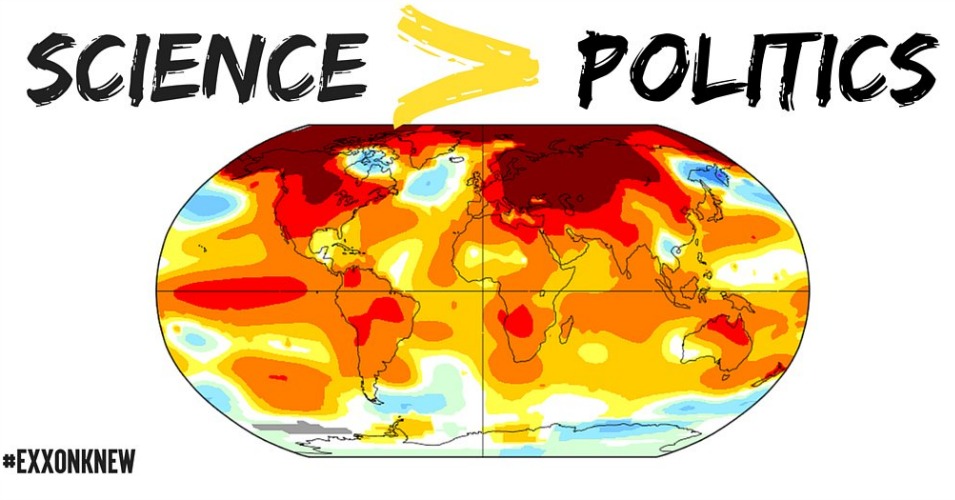Refusing to submit to House inquiry, environmental groups question whether committee is “operating properly” or just acting out a “partisan effort to protect fossil fuel companies.”
By Lauren McCauley, staff writer for Common Dreams. Published 6-1-2016

“If companies publicly denied climate change while knowing all along how dangerous it was, they should be held accountable,” said Greenpeace executive director Annie Leonard. (Image: Exxonknew.org)
Environmental groups that have become targets of a Republican-led effort to insulate ExxonMobil against accusations of fraud and climate science suppression dug in a bit deeper on Wednesday by refusing to submit to a Congressional inquiry on the matter.
As Common Dreams previously reported, House Republicans with the Committee on Space, Science and Technology sent a letter (pdf) on May 18th to 17 attorneys general and eight environmental organizations—including 350.org, Greenpeace, and the Union of Concerned Scientists—claiming their #ExxonKnew effort amounted to a violation of climate deniers’ First Amendment rights and demanding that they submit communications related to state investigations into Exxon Mobil.
That over-broad request had a deadline of noon on June 1.
In a searing rebuke (pdf) sent Wednesday to committee chairman Rep. Lamar Smith (R-Texas), Greenpeace attorney Abbe David Lowell questions whether the committee is “operating properly” or just acting out a “partisan effort to protect fossil fuel companies.”
The letter states:
As I understand it, the Committee is looking to determine whether state attorneys general and non-profit, non-governmental, or other groups committed to protecting the earth and its environment have somehow colluded to stifle first amendment protected speech of one or more of the most powerful and wealthiest companies in the world.
I am sure that you, your colleagues, and your staff could not help but notice the irony in your inquiry. In the name of protecting the free speech of these companies, you are looking to examine the very free speech activity of groups actively trying to advance public discussion on such a vital topic.
Lowell argues that the request was unreasonably broad, and violated the groups’ rights to free speech and free assembly, as well as interfered with their right to petition government officials.
“To be clear, Greenpeace will always cooperate with any authorized and legitimate inquiry of Congress or anyone else into one of the most pressing issues of our time—one that will affect our children and their children for generations to come,” the letter concludes.
According to the Washington Post, other organizations targeted by the congressional committee also resisted.
A letter sent Wednesday from the law firm Quinn Emanuel Urquhart & Sullivan on behalf 350.org stated: “In a democracy built on principles and the rule of law, 350.org cannot in good faith comply with an illegitimate government request that encroaches so fundamentally on its and its colleagues’ protected constitutional rights.”
The Post report continues:
Quinn Emanuel, which also wrote a response for the Rockefeller Family Fund, said that courts have not supported forced disclosure of communications within advocacy groups. It quoted a decision in one case that said: “Implicit in the right to associate with others to advance one’s shared political beliefs is the right to exchange ideas and formulate strategy and messages, and to do so in private. Compelling disclosure of internal campaign communications can chill the exercise of these rights.”
A letter from the Union of Concerned Scientists said that while the committee said it was acting in the name of “transparency,” the Supreme Court has said that “there is no general authority to expose the private affairs of individuals without justification in terms of the functions of the Congress … [n]or is the Congress a law enforcement or trial agency.”
The 350.org letter said that Congress could not interfere with the state attorneys general investigations even if it disagrees with them.
“Because you cannot interfere directly with state investigations and prosecutions, you cannot do so indirectly by requesting communications from private organizations with state attorneys general or others about state investigations and prosecutions,” the Quinn Emanuel letter said.
Maryland Attorney General Brian Frosh also rejected the committee’s request for information.
In a press statement, Greenpeace executive director Annie Leonard reiterated the organization’s commitment to protecting the planet and holding Exxon accountable for its climate crimes.
“While Exxon has been muddying the science and delaying meaningful debate on what to do about climate change, Greenpeace has been working to reduce the emissions that cause climate change, advocating for corporate and government policies that address climate change, and exposing the corporations, lobbyists, and front groups that deny the existence of climate change and its causes,” Leonard stated. “Despite all of this, it might already be too late to stop the worst effects of climate change.
“The First Amendment protects advocating for regressive and misguided policy, for which Exxon and its enablers are no doubt thankful, but it does not protect fraud,” she added. “If companies publicly denied climate change while knowing all along how dangerous it was, they should be held accountable.”

